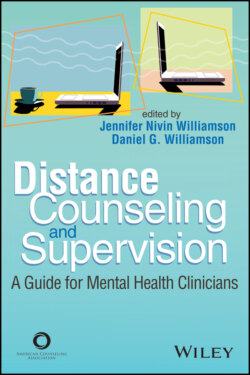Читать книгу Distance Counseling and Supervision - Группа авторов - Страница 13
Assessing Appropriateness for Technology-Assisted Services
ОглавлениеCounselors must recognize that not all clients will be well served through telebehavioral health services; therefore, it is imperative for them to assess a client’s appropriateness for technology-assisted services prior to beginning distance counseling. The ACA Code of Ethics states that “counselors make reasonable efforts to determine that clients are intellectually, emotionally, physically, linguistically, and functionally capable of using the application and that the application is appropriate for the needs of the client” (ACA, 2014, Standard H.4.c.). Counselors must recognize that distance counseling services are not appropriate for every client; in those situations, they should consider offering face-to-face services or providing appropriate referrals for those clients. This assessment of client appropriateness should be an ongoing process to ensure the client is using technology in an appropriate manner (ACA, 2014; Stolsmark, 2015). It is important for counselors to assess several categories of appropriateness, including access to and knowledge about technology, counseling space and netiquette, emotional stability, and safety and emergency risk management. It is recommended that counselors meet with clients in person when possible to conduct this assessment, to verify their identity, and to conduct an initial informed consent interview. When an in-person session is not possible, a synchronous videoconferencing session might be appropriate (AMFTRB, 2016). It is important for clients to understand the risks and limits to confidentiality prior to engaging in an initial session using technology. Clinicians should consider the following areas of appropriateness prior to engaging in virtual clinical services with clients.
